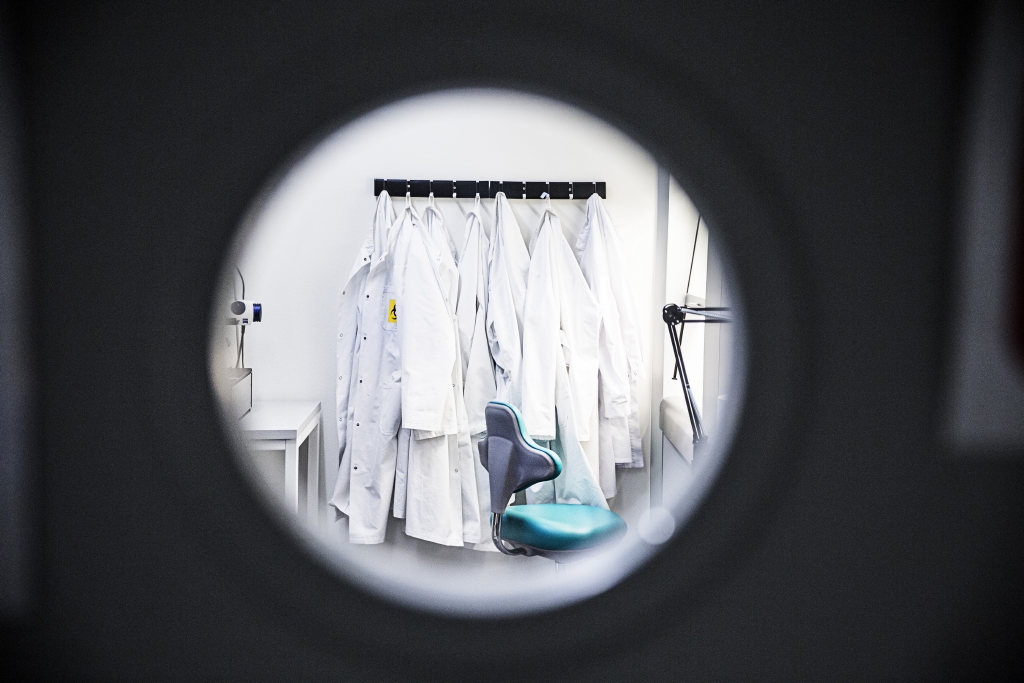Gradual re-opening of research facilities is underway
The government has expanded the framework for the gradual reopening of society to include certain research activities. This means that work has now started to prepare the relevant research facilities, so that they comply with the guidelines laid down by Universities Denmark and the Danish Health Authority.

Since the Danish Prime Minister's announcement on 17 April, when she enabled a gradual reopening of certain critical research activities, Aarhus University and the other universities in Denmark have been in close dialogue with the Ministry of Higher Education and Science to clarify the extent to which, and under what conditions, access may be granted to research laboratories.
In order to re-open, there will be much focus on the physical surroundings in which additional safety measures will have to be taken in order to avoid contamination in and around the laboratories, and so that the health authorities' guidelines on social distancing, hygiene and protective equipment can be met.
"In the past few days, we’ve been working to meet the requirements for a safe and controlled reopening of the laboratories. Staff at Estates Facilities have been reorganising, cleaning and readying the facilities that will be part of this first stage in the gradual reopening. The labs have been empty for over a month, so it's not just about opening the door and letting people in to use them. But we'll be ready," says Bent Lorenzen.
It has always been clear that the political agreement will only provide for a very limited reopening, and that reopening will have to be in accordance with common guidelines to ensure that it takes place safely. Since the political announcement from the government, there has been a lot of work to identify the specific areas that need access to the laboratories first, explains Bent Lorenzen.
"We are, and regularly have been, in close dialogue with the department and faculty management teams about which facilities are to be part of this first stage of reopening. More specifically, each department has been tasked to describe the needs to be met at the laboratories, and we’ve found the initiatives and procedures required to support these defined needs."
An individual, shared responsibility
Once the limited reopening has come into force, it will be possible to monitor the use and access to the research laboratories on an ongoing basis. This is partly to be able to adjust cleaning procedures and to clarify needs with the individual departments, for example, but also to ensure that the common guidelines for behaviour are followed by the staff who now have access to the laboratories.
"We’ll set up the framework to ensure that laboratories live up to the Health Agency's guidelines, and we’ve drawn up new cleaning protocols on the basis of the reopening requirements that have now been submitted. We can correct and change our tasks, but we also need individual users to help the university to live up to the guidelines. Therefore, there is a certain responsibility for the individual users now working in the labs again," says Bent Lorenzen.
Universities Denmark has jointly formulated the guidelines. The guidelines have since been reviewed and approved by the Danish Health Authority. The partial reopening of the labs can only take place if everyone follows the guidelines from the Danish Health Authority.
As a result of a national agreement on the expansion of the first phase of a controlled re-opening of society, a partial reopening of research laboratories for staff and students has been authorised.
Through Universities Denmark, special rules have been laid down for work in research labs effective as of 21 April.
- At any given time, a maximum of 25 per cent of normal staffing may be present in each lab (for example, max. three people in a 12-person lab).
- Labs must be booked online to ensure coordination and registration of access.
- Everyone must wear gloves in all labs, regardless of classification.
- Staff may not work side-by-side, and staff must comply with the authorities’ recommended social distance of 1.5 -2 m.
- An agreement with the individual employee’s immediate supervisor must be made regarding how lab work is to be organised, with due consideration for the situation of the individual.
- Only one person at a time is allowed in rooms under 10 m2.
- After completing work, employees must disinfect all contact surfaces, including light switches, handles, keyboards, equipment, etc.
- Reduced lab service.
- Touching other people in the lab is NOT permitted. You must perform your activities in isolation.
In addition, the partial reopening of the labs is conditional on compliance with these instructions from the Danish Health Authority:
- Maintain social distancing, practice good hand hygiene, and cough or sneeze into your sleeve.
- Do not come to work if you feel unwell or if you have coronavirus symptoms.
- If you develop symptoms of the disease, you must stay at home until you have been asymptomatic for at least two days. If you start getting symptoms at work, you must go home immediately.
- Avoid spending longer periods of time in the same room with people.
- Take breaks in separate rooms and maintain social distancing.
- Only one person in the elevator at a time.
- Access to break rooms and the like is prohibited.
Yderligere information:
Read the announcement from the senior management team about the gradual reopening of the university.